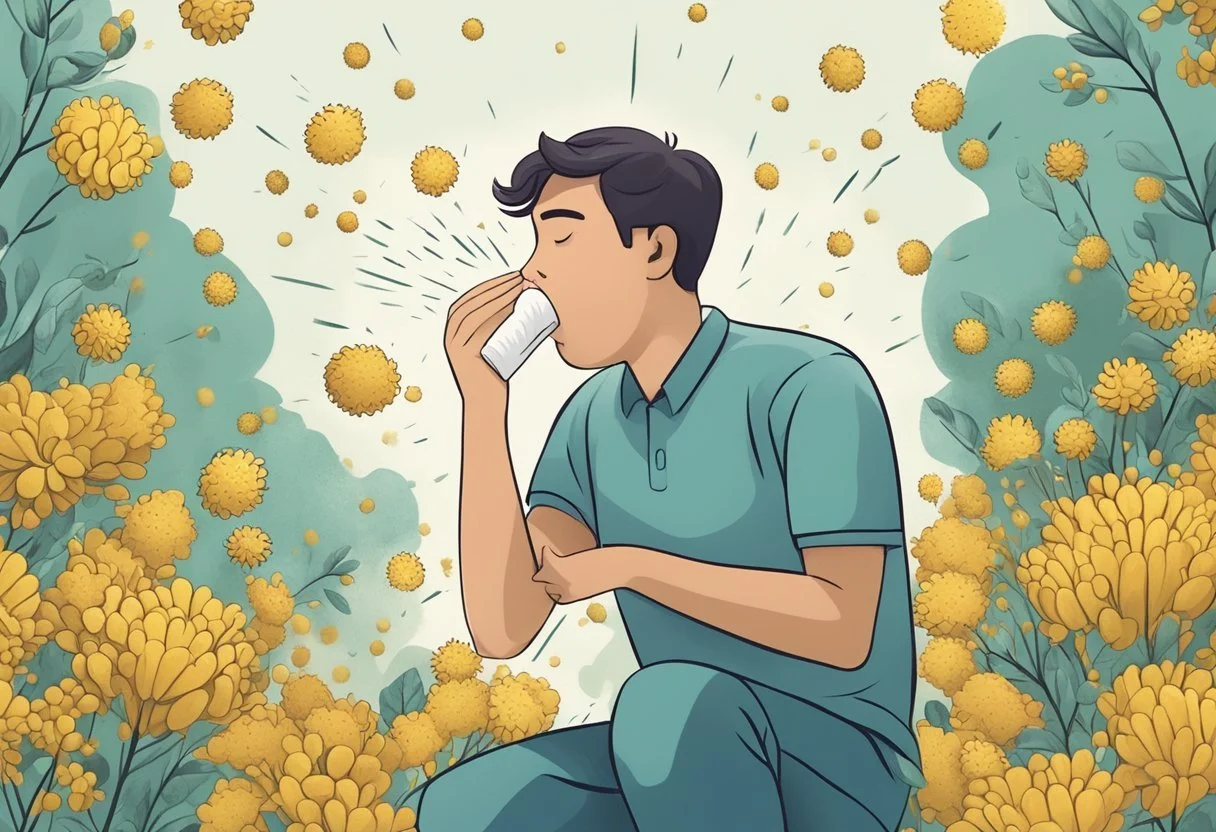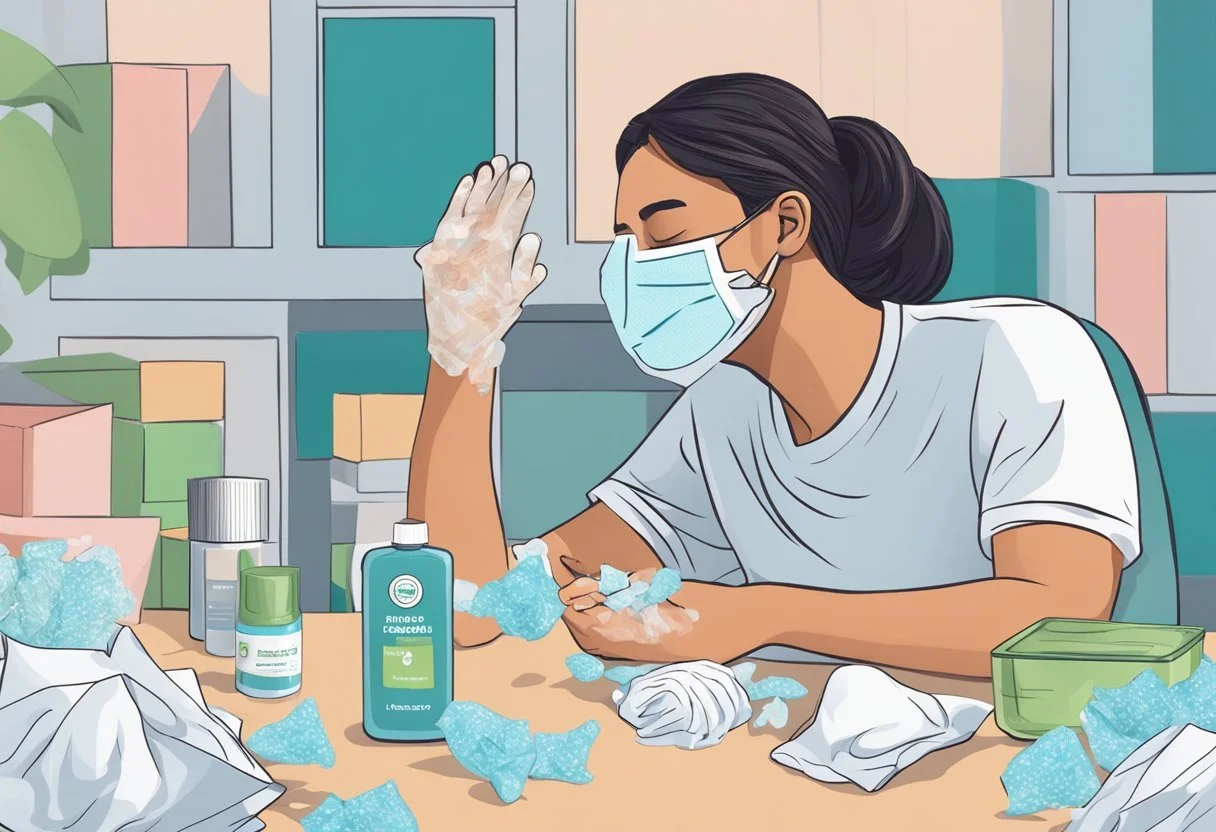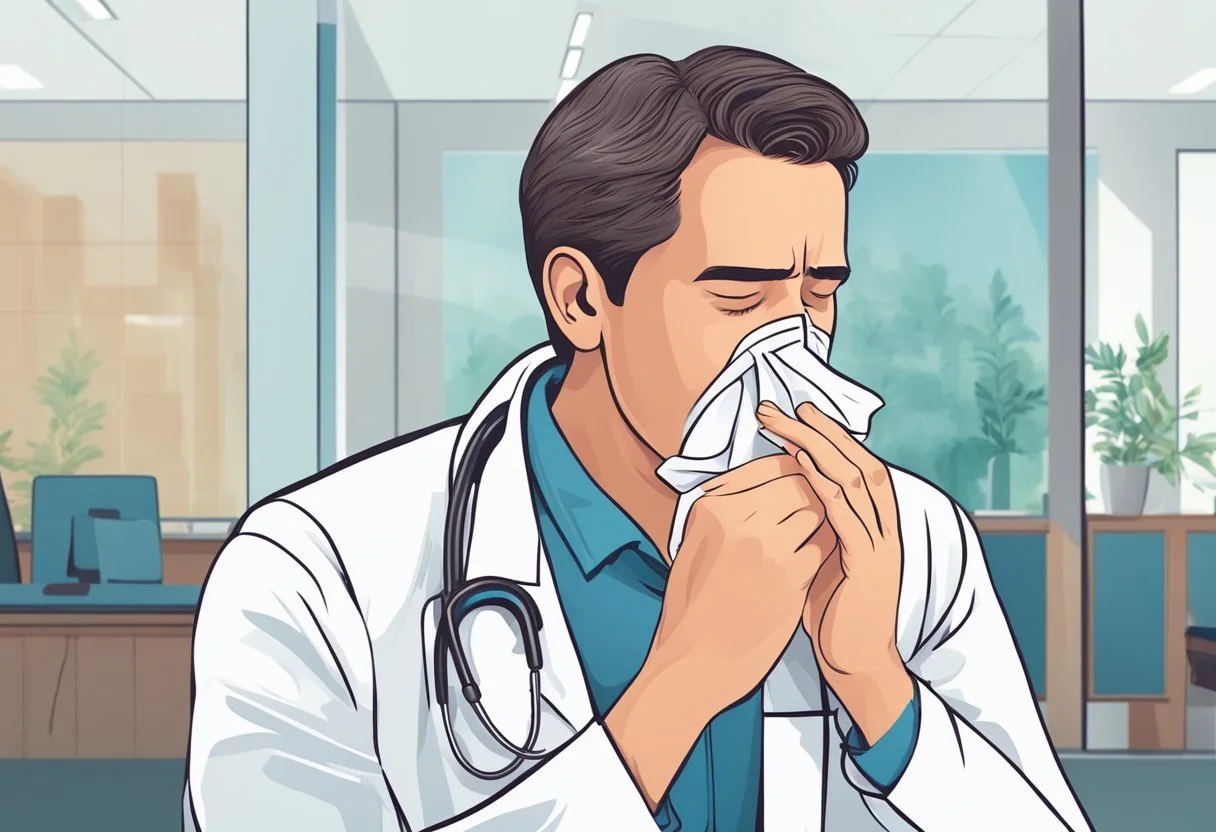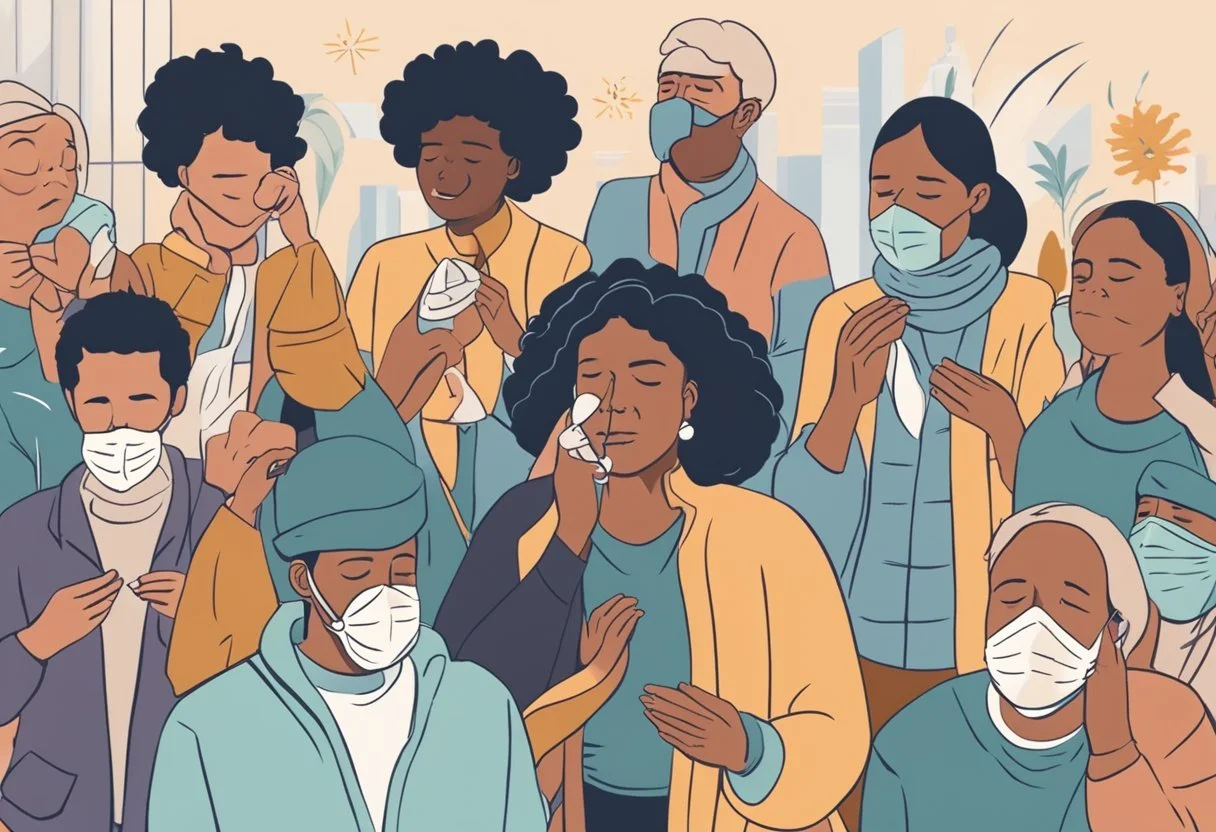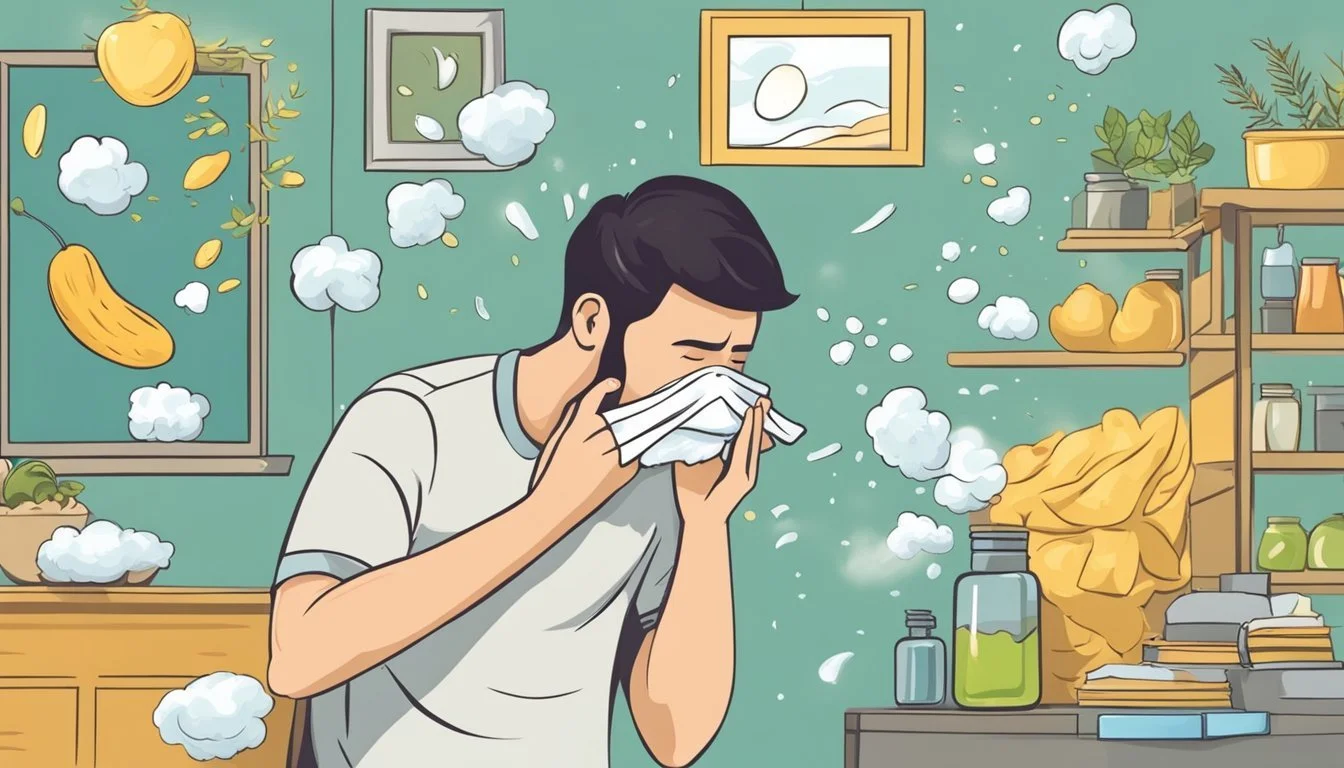Sneezing
Symptoms, Causes, and Home Remedies
Discover > Health Conditions > Sneezing
Sneezing, a seemingly simple and universally experienced bodily function, can sometimes become a source of annoyance or concern when it persists or occurs frequently. The act of sneezing, or sternutation, serves a crucial purpose in maintaining overall respiratory health and defending against environmental irritants. Delving into the symptoms, causes, and home remedies for sneezing, this article offers insight into this common and sometimes mystifying physiological response.
Despite the sneeze being a commonplace reflex, many people may not be aware of the various root causes that can lead to this reaction. A multitude of factors, including allergens, irritants, infections, and even certain medications, can provoke sneezing. In some cases, changes in environmental conditions, such as temperature shifts or exposure to bright light, might elicit a sneeze. Understanding these underlying causes can provide valuable information on effectively managing and mitigating sneezing episodes.
In addressing and coping with routine sneezing, a variety of home remedies and preventative measures can be implemented. From ensuring proper indoor humidity to regularly cleaning living spaces, these strategies can significantly reduce the frequency and intensity of sneezing episodes. As each individual's body and sensitivities differ, a tailored approach may be essential for optimal results.
Understanding Sneezing
Definition and Mechanism
Sneezing is an involuntary, forceful, and sudden expulsion of air through the nose and mouth. It typically occurs when the immune system reacts to various irritants to help clear the throat and nose. The process of sneezing involves the following steps:
The triggers or irritants come into contact with the lining of the nose.
nerves in the nasal passage send a signal to the brain.
The brain initiates a coordinated response to expel the irritant.
The muscles of the throat and chest contract.
Air pressure builds up behind the nose and in the chest.
Finally, the air is forcefully expelled through the nose and mouth.
During a sneeze, the body releases histamine, a chemical that plays a significant role in the immune response. Histamine is responsible for dilating blood vessels, signaling the immune system to address the irritant, and promoting the expulsion of mucus.
Common Triggers and Types
Sneezing can be prompted by various triggers and factors, such as:
Allergens: Common allergens like pollen, dust, pet dander, and mold spores can provoke sneezing. The body perceives these particles as harmful invaders and releases histamine to combat them.
Germs: Viruses, bacteria, and other pathogens can irritate the nasal passages, causing sneezing as the body attempts to remove the threat.
Age: As people age, their nasal passages may become more sensitive, leading to more frequent sneezing.
Environmental factors: Strong odors, pollution, cigarette smoke, and changes in humidity or temperature can irritate the nose and trigger sneezing.
Based on the cause, there are two primary types of sneezing:
Allergic sneezing: This is caused by an overactive immune response to allergens. It typically occurs in people with allergies.
Non-allergic sneezing: This type of sneezing is not triggered by allergens. Instead, it can be caused by environmental factors, germs, or age-related changes in the nasal passage.
By understanding the various triggers and types of sneezing, individuals can better identify potential causes and employ appropriate home remedies to alleviate their symptoms.
Identifying Causes
Allergies and Allergens
Allergies are the most common cause of sneezing as the body's immune system reacts to allergens. Some common allergens include:
Pollen: Responsible for seasonal allergies, pollen is a fine powder released by plants during their reproductive season.
Dust: Composed of various particles, including pet dander and dead skin cells, dust can be a major cause of sneezing.
Mold: Fungal growth in damp areas, mold releases spores that can trigger an allergic reaction.
Foods: While certain foods may not cause sneezing directly, food allergies can lead to increased mucus production, which in turn may cause sneezing.
Infections and Viruses
Sneezing can also be caused by infections and viruses, with the common cold and flu being primary examples. These infections are often caused by:
Viral Infections - Rhinoviruses, Influenza virus, etc.
Bacterial Infections - Streptococcus pneumoniae, Haemophilus influenzae, etc.
As the body fights off these infections, sneezing helps expel mucus containing trapped pathogens, thus helping in the recovery process.
Other Triggers
Apart from allergies and infections, some people may experience sneezing due to non-allergic rhinitis or other triggers. These can include:
Irritants: Environmental irritants like smoke, perfume, and chemicals can cause the nasal passages to become inflamed, leading to sneezing.
Bright Light: A sudden exposure to bright light, known as the photic sneeze reflex, can cause sneezing in some individuals.
Temperature Changes: Rapid fluctuations in temperature may also trigger sneezing, as the nasal passages adjust to the change in conditions.
Identifying the specific cause of sneezing is important to effectively manage and prevent this common symptom.
Symptoms Associated with Sneezing
Nasal Symptoms
Sneezing often comes with a range of nasal symptoms that may make people feel uncomfortable. These can include:
Runny nose: Also known as rhinorrhea, a runny nose is characterized by excessive production of watery, clear mucus from the nasal passages.
Congestion: Inflammation and swelling of the nasal passages and sinuses can cause congestion, making it difficult to breathe through the nose.
Itchy nose: An itchy nose is often triggered by allergens or irritants, such as pollen, dust, or pet dander. This itchiness can stimulate the sneeze reflex.
Sinus pressure: Blocked sinuses can lead to a feeling of pressure or pain around the face and head.
Respiratory Symptoms
Sneezing can also be accompanied by several respiratory symptoms, including:
Cough: A cough may develop alongside sneezing as a result of irritation or inflammation in the respiratory tract.
Asthma: Sneezing can be a trigger for asthma symptoms in some individuals, such as wheezing, shortness of breath, or chest tightness.
Related Sensitivities
Sneezing and its associated symptoms can sometimes lead to increased sensitivity to environmental factors, such as:
Itchy eyes: Similar to an itchy nose, allergens or irritants can cause itchiness and redness in the eyes. This may occur alongside sneezing in some people.
Light sensitivity: During a sneezing episode, some individuals may experience sensitivity to bright lights, known as photophobia.
To summarize, sneezing is often accompanied by a range of nasal, respiratory, and related sensitivity symptoms, including runny nose, congestion, itchy nose, sinus pressure, cough, asthma, itchy eyes, and light sensitivity.
Effective Home Remedies
Natural Treatments
There are several natural treatments that can help alleviate sneezing and other related symptoms. One of the most common home remedies is increasing the intake of vitamin C. This can be achieved by consuming citrus fruits, kiwi, and strawberries, or by taking supplements.
Another effective treatment is consuming spicy foods, such as chili peppers or horseradish, which can help to clear the nasal passages and provide relief from congestion. Additionally, drinking hot teas or warm water with honey and lemon can soothe a sore throat and reduce irritation that can lead to sneezing.
Lifestyle and Environmental Changes
Making certain lifestyle and environmental changes can help in managing sneezing symptoms. Ensuring proper rest is essential in allowing the body to heal and recover more effectively. Maintaining a good sleep schedule and getting 7 to 9 hours of quality sleep every night can prove to be beneficial.
Controlling the environment around you is another important factor in managing sneezing symptoms. Using a humidifier can help to maintain an optimal level of humidity in your living space, keeping the air moist and reducing nasal dryness and congestion.
Here is a list of suggested environmental changes to reduce sneezing triggers:
Regularly clean and dust your living spaces to eliminate allergens.
Invest in an air purifier to reduce the presence of allergens and irritants in the air.
Remove items that can collect allergens, such as carpets, heavy drapes or stuffed animals.
Wash bedding and fabrics in hot water to remove allergens and dust mites.
Keep windows closed during pollen season, and use an air conditioner with a HEPA filter to prevent pollen from entering.
By implementing these natural treatments and lifestyle adjustments, one can experience relief from sneezing and improve their overall health and well-being.
Medical Treatments
Medications
There are several medications available to treat sneezing. Some common options include:
Antihistamines: These medicines help block the release of histamine, a chemical that contributes to sneezing and other allergy symptoms. Both over-the-counter and prescription antihistamines are available, such as diphenhydramine, cetirizine, and loratadine.
Corticosteroids: Steroid nasal sprays, such as fluticasone and budesonide, help reduce nasal inflammation, which can lead to sneezing. These are usually available by prescription only.
Decongestants: Available in pills or nasal sprays, decongestants can help relieve sneezing caused by nasal congestion. However, decongestant nasal sprays should not be used for more than three days, as they can cause rebound congestion.
Allergy Management
Allergy management plays a crucial role in treating sneezing caused by allergic reactions. Some strategies to manage allergies include:
Identifying allergens: Identifying the substances that cause an allergic reaction is the first step toward effective allergy management.
Avoiding exposure: Once allergens are identified, avoid exposure to these substances whenever possible.
Allergy shots (immunotherapy): Allergy shots can be an effective option for individuals who suffer from persistent sneezing due to allergies. Immunotherapy helps the immune system gradually build up a tolerance to the allergen through consistent exposure to small amounts of the allergen, eventually reducing symptoms.
Professional Interventions
Sometimes, sneezing may require professional medical intervention. This is especially true if home remedies and over-the-counter medications prove ineffective, or if there are complications such as sinus infections or asthma. In these cases, consulting with a healthcare professional is essential.
Healthcare providers may recommend a combination of medications, allergy shots, or other treatments to best address the cause of the sneezing. In some cases, referral to an allergist, ENT specialist, or other medical expert may be necessary for more targeted or specialized care.
Preventive Measures
Avoiding Allergens
One of the first strategies to prevent sneezing is to avoid allergens that trigger the reaction. Identifying the specific allergens responsible for personal sneezing can be crucial in managing symptoms effectively. Here are some ways to minimize exposure to common allergens:
Pollens: Keep windows closed during pollen season, use air conditioning, and avoid outdoor activities during high pollen times.
Dust: Maintain a clean environment by regularly vacuuming and washing curtains, sheets, and other household textiles.
Pet Dander: Bathe and groom pets regularly; consider allergy shots if symptoms persist.
Mold: Ensure proper ventilation in damp areas of your home and regularly clean air conditioning filters and humidifiers.
Some situations may require the use of protective gear to minimize allergen exposure. Wearing a face mask can offer protection against many common allergens such as dust, pollen, and pet dander.
Strengthening Immune Health
A healthy immune system tends to lessen the frequency and intensity of sneezing episodes. Various factors can influence immune health, including diet, exercise, sleep, and stress management. Incorporating helpful habits can enhance immune function and contribute to overall well-being:
Diet: Consume a balanced diet rich in fruits, vegetables, whole grains, lean proteins, and healthy fats.
Exercise: Engage in regular physical activity, aiming for at least 150 minutes of moderate exercise or 75 minutes of vigorous exercise per week.
Sleep: Prioritize sleep, aiming for 7-9 hours per night for adults; adequate sleep is essential for immune function.
Stress management: Utilize stress reduction techniques such as mindfulness, meditation, and deep breathing exercises to maintain mental health and support immune function.
Remember that while these preventive measures can help decrease the frequency and severity of sneezing episodes, it may not eliminate them entirely. Consult with a healthcare professional for expert advice on managing sneezing and related symptoms.
When to Seek Medical Advice
Recognizing Complications
Occasionally, sneezing can indicate more than just a common cold. It's important to be aware of complications that may arise from persistent sneezing. For instance, inflammation can be caused by an ongoing sneezing issue, such as allergic rhinitis, sinusitis, or even asthma attacks.
Continual sneezing can also contribute to blood pressure issues and put undue stress on the body. In rare cases, uncontrolled sneezing may be a symptom of a more serious condition, such as cancer. Consider the following complications that could be associated with sneezing:
Inflammation
Allergic Rhinitis
Sinusitis
Asthma Attacks
Blood Pressure Issues
Cancer
If you or someone you know is experiencing excessive sneezing accompanied by any of these complications, it's crucial to seek medical attention.
Consulting Healthcare Professionals
It's essential to consult a healthcare professional if you notice excessive sneezing that doesn't improve with home remedies or over time. For example, if sneezing persists for more than a week or worsens, it's advisable to seek professional help. Additionally, if you suspect that your sneezing might be related to a more severe condition, such as the complications mentioned above, don't hesitate to reach out to a medical professional.
Here are some situations where you should consider seeking medical advice:
Sneezing that persists for more than a week
Worsening symptoms
Suspected complications related to sneezing (e.g., sinusitis, asthma attacks, etc.)
In conclusion, while sneezing is a common occurrence that's typically harmless, it's vital to be aware of potential complications and know when to seek medical assistance. Always consult a healthcare professional if you're concerned about your symptoms or suspect a more severe condition may be at play.
Considerations for Specific Populations
Age-Related Conditions
Children: Younger children are more susceptible to infections and allergies due to their developing immune systems. Common colds and flu are often accompanied by sneezing in children. Teaching them proper hygiene, such as covering their mouth and nose while sneezing, can help prevent the spread of infections. Additionally, it is essential to monitor their exposure to potential allergens since sneezing could be an indication of an underlying allergy.
Elderly: The immune system weakens with age, making the elderly more prone to infections and allergies. Frequent sneezing in older adults might be a sign of an underlying health issue, rather than a simple cold. It is crucial to consult a healthcare professional to rule out more severe conditions. Regular vaccinations and maintaining a clean environment can help minimize sneezing episodes in the elderly.
Pregnancy and Sneezing
During pregnancy, women often experience changes in their immune system, making them more susceptible to infections and allergies. Sneezing frequently during pregnancy might be an indication of an infection, such as the common cold or flu, which should be addressed by a healthcare provider.
In addition, hormonal fluctuations during pregnancy can cause nasal congestion, known as rhinitis of pregnancy, leading to sneezing. This can usually be managed with saline nasal sprays or humidifiers.
Here are some home remedies to alleviate sneezing for pregnant women:
Use a saline nasal spray regularly
Run a humidifier in the bedroom
Stay well-hydrated
Use proper hand hygiene to avoid infections
Maintain cleanliness and avoid allergens in the environment
It is crucial to consult a healthcare provider before taking any over-the-counter medications during pregnancy to ensure they are safe for both the mother and the baby.
Research and Future Directions
Innovations in Allergy Treatments
Recent advancements in allergy treatments have focused on improving the lives of individuals who experience frequent sneezing due to various causes. Future treatments aim to address the root cause of sneezing more effectively, rather than simply managing symptoms. Some advancements include the development of new medications, such as biologics, which target specific immune system pathways responsible for allergic reactions.
The potential effects of COVID-19 on sneezing and other allergy symptoms are also under investigation. Research has shown that some allergy sufferers might experience intensified sneezing and irritation due to the increased use of face masks and sanitizers. Further studies are being conducted to better understand this relationship and develop appropriate prevention strategies.
Emerging Studies on Sneezing
Interesting correlations have been found between sneezing and other factors, based on recent studies:
Genetic factors: Research has suggested that the sneezing reflex may be influenced by genetic factors, as some individuals may be more susceptible to sneezing than others.
Climate: Environmental factors, such as humidity and temperature, have been found to impact sneezing frequency and severity.
Sneezing patterns: Some studies have explored the phenomenon of "sneezing fits," where individuals go through multiple sneezes in quick succession, and the potential physiological mechanisms behind this response.
In summary, the growing body of research on sneezing has resulted in various innovations in allergy treatments and an increased understanding of how external factors can influence this reflex. Future advancements in the field will continue to improve preventative care and alleviate the burden of sneezing and associated symptoms for the affected individuals.
Conclusion
Sneezing is a natural bodily function that helps to remove irritants and protect the respiratory system. It is generally caused by various factors, such as allergens, infections, and environmental irritants.
To alleviate symptoms and reduce the frequency of sneezing, one can try home remedies alongside any appropriate medical treatment. Some effective home remedies include:
Increasing humidity, which can be achieved using a humidifier or taking a hot shower.
Drinking plenty of water to stay hydrated and maintain moist respiratory passages.
Utilizing essential oils like eucalyptus and peppermint oil (how long does peppermint oil last?).
Practicing nasal irrigation with saline solutions or a neti pot.
Furthermore, individuals can minimize exposure to common irritants by maintaining a clean environment and avoiding allergens when possible. In cases where sneezing is persistent or accompanied by other severe symptoms, seeking professional medical advice is necessary to determine the underlying cause and ensure proper treatment.
In the end, understanding the sneezing phenomenon and incorporating these practical solutions into daily life can significantly help individuals to manage their symptoms and enjoy a better quality of life.
#hay fever #stop sneezing #frequent sneezing attacks #kill dust mites #dry air #animal dander #people sneeze #trigeminal nerve #nasal tissue #photic sneezing #sneezing fit


